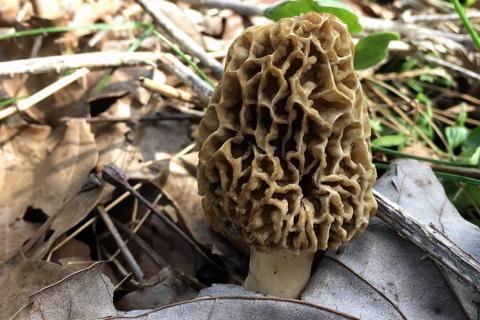
The words turkey hunting and morel mushrooms go together just like peanut butter and jelly. For years turkey hunters have headed to the woods during the spring in chase of gobbling longbeards. If someone were to hide and watch a hunter walk through the woods, they would first assume that they were observing every step they took to make sure they were walking properly. In reality, they are scanning the ground for Mother Nature's treasure, the morel mushroom.
 During the 2017 Missouri youth turkey season, I was guiding a youngster near a natural spring area that ran into the Eleven Point River in southern Missouri. During midday, when the hunting had slowed down, we spent some time searching the grounds to find the boy his first morel mushroom. Anyone who has ever spent anytime looking for these tasty treats knows that there are certain areas that seem to “look good” for finding morels. This was one of those places, a river bottom like scenery with steep hills on each side of the running spring, should have been the perfect place to come upon some morels.
During the 2017 Missouri youth turkey season, I was guiding a youngster near a natural spring area that ran into the Eleven Point River in southern Missouri. During midday, when the hunting had slowed down, we spent some time searching the grounds to find the boy his first morel mushroom. Anyone who has ever spent anytime looking for these tasty treats knows that there are certain areas that seem to “look good” for finding morels. This was one of those places, a river bottom like scenery with steep hills on each side of the running spring, should have been the perfect place to come upon some morels.
After an hour of looking with no success, we decided to walk back to the top of the ridge to begin our game plan for the afternoons hunt. As we were walking up the steep utility road we begin finding morels along the sides, under every overhanging limb of trees that we came upon hosted a group of 12 to 20 morels. We spent the next thirty minutes filling our turkey vest with mushrooms. This experience was a perfect example of why morel hunting is a fun time, when you least expect to find them, there they are. If one has never enjoyed morels, here is a small guide to help you become introduced to this delectable mushroom.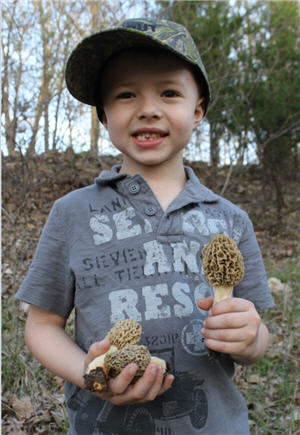
1. Best Time of the Year to Hunt for Morels
Besides being a tasty meal, one of the reasons finding morels is so anticipated is because it is a sign of warm weather and spring. Throughout most of United States morels begin popping up from March as soon as the temperatures begin rising through August depending upon your state. This is why mushroom hunting is so popular amongst turkey hunters, as it takes place right along with turkey season. Most turkey hunters will say that fried turkey breast and morels are the perfect combination.
![]() Tip: A great time to find morels is after a rain. After the ground is well saturated with moisture, and the sun comes out to warm the ground again, morels seem to show up the most. Morels do not like dry conditions.
Tip: A great time to find morels is after a rain. After the ground is well saturated with moisture, and the sun comes out to warm the ground again, morels seem to show up the most. Morels do not like dry conditions.
![]() Tip: "False morels," while sometimes can be consumed without ill effects, have been known to cause acute toxicity. The cap of the false morel appears wrinkled or "brainy," while real morels have honeycomb or net-like caps. An easier way to determine their difference: When the stem is cut open, false morels contain a cotton ball-type substance, while stems of the real kind are hollow.
Tip: "False morels," while sometimes can be consumed without ill effects, have been known to cause acute toxicity. The cap of the false morel appears wrinkled or "brainy," while real morels have honeycomb or net-like caps. An easier way to determine their difference: When the stem is cut open, false morels contain a cotton ball-type substance, while stems of the real kind are hollow.
Check out this drawing showing what true morels and false morels look like here.
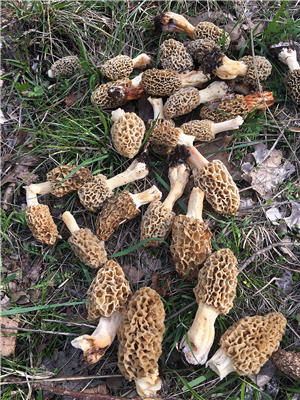 2. Best Places to Find Morel Mushrooms
2. Best Places to Find Morel Mushrooms
The most common asked question among morel hunters is where to find them. There are several opinions on where they actually grow. Some say near ash trees, cedar trees, and oak trees while others have the opinion that along the side of a sloping hill, and in well shaded areas that hold moisture, are the places to look to have the best luck. These are just opinions from successful mushroom hunters, in my opinion they could be literally anywhere, so make sure to pay attention at all times when seeking out morels
![]() Tip: An old saying when finding morels, is wherever you find a group of morels one year they will continues to show up year after year. In my own personal experience this old wise tale is accurate!
Tip: An old saying when finding morels, is wherever you find a group of morels one year they will continues to show up year after year. In my own personal experience this old wise tale is accurate!
![]() Tip: Check out this revealing paper on SPRING MORELS AND FALSE MORELS OF MIDCONTINENTAL U.S. by H uffman & Tiffany, December 2001
Tip: Check out this revealing paper on SPRING MORELS AND FALSE MORELS OF MIDCONTINENTAL U.S. by H uffman & Tiffany, December 2001
3. Best Way to Prepare Morels for Your Favorite Recipes
These meaty morsels are a treasure of the woods, often enticing hunters and non hunters alike to venture out in the early spring in search of the tasty treats.
Every mushroom lover has their favorite go to morel recipe and here are two very easy recipes that are sure to delight the taste buds.
![]() Tip: Make sure to properly clean morels by soaking them for at least 30 minutes in cold, lightly salted water. Follow the soaking process by rinsing and drying them on a paper towel before cooking - never eat morels raw.
Tip: Make sure to properly clean morels by soaking them for at least 30 minutes in cold, lightly salted water. Follow the soaking process by rinsing and drying them on a paper towel before cooking - never eat morels raw.
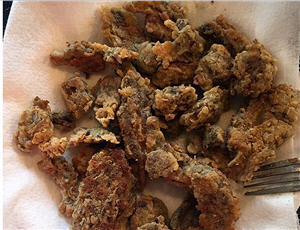 Simple Pan Fried Morel Mushroom Recipe
Simple Pan Fried Morel Mushroom Recipe
Ingredients:
- 12 - 16 ounces morels
- 1 cup flour
- 1 cup shortening
- Salt to taste
Directions:
Cut the morels lengthwise leaving the stems. Place flour in a shallow bowl. Heat your shortening on medium heat in a skillet until very hot. Roll mushrooms in flour tapping off any excess. Place the mushrooms in the hot shortening and turn them often. Fry until crisp and golden brown (5-9 minutes). Place fried mushrooms onto paper towels and salt to taste.
Simple Oven Baked Morel Mushroom Recipe
Ingredients:
- 12 - 16 ounces morels
- 1 egg
- 1/2 cup cracker crumbs
- 2 tbsp. olive oil
- 5 tbsp. butter
Directions:
Cut the morels lengthwise leaving the stems. Whisk an egg in a small bowl and roll each morel mushroom in the egg mixture. Mix the cracker crumbs, salt and pepper in a freezer bag and shake the mushrooms in the bag. Melt olive oil and butter in a skillet. Pour the melted butter and oil mixture into a baking dish. Spread the breaded morels in the baking dish. Bake the morels until they turn brown and crisp - turning occasionally at 325 degrees for about 20 minutes. Keep checking every five minutes until they achieve the brown and crisp look. Remove from baking dish and drain excess oil onto a paper towel.
Drawing comparing how true morels and false morels are different from a General Technical Report by US Forest Service
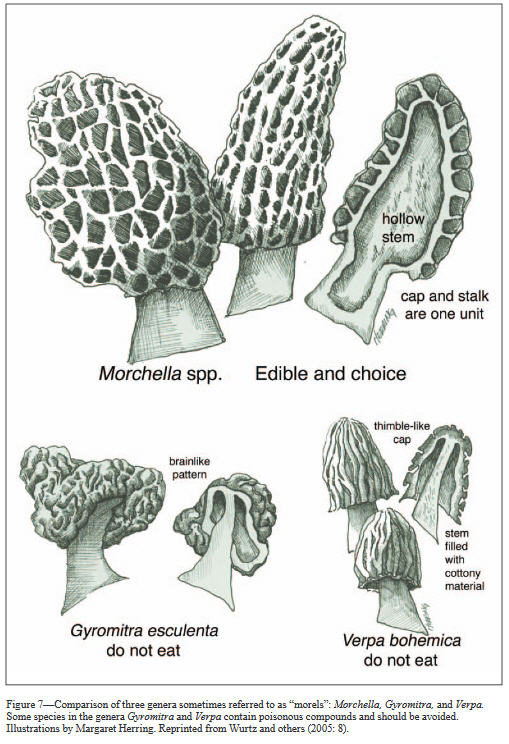
illustrations by Margaret Herring, image credit: U.S. Forest Service
- 5642 views

